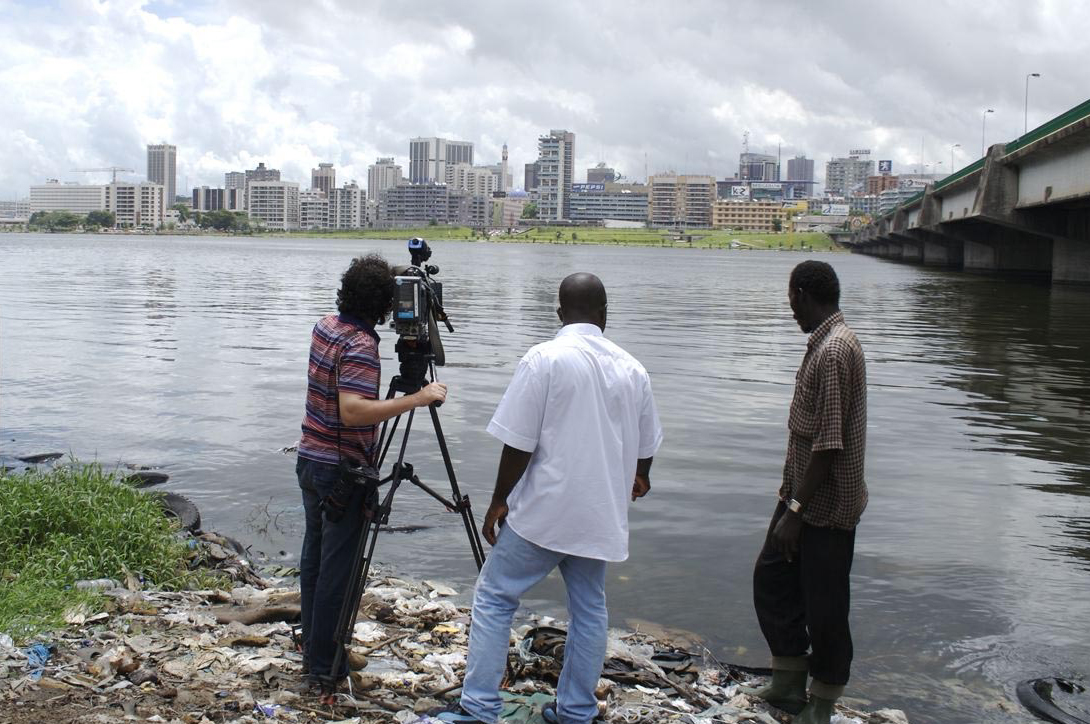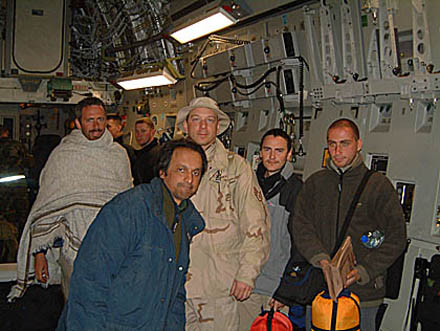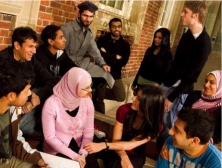 Preparing to capture the Abidjan skyline as part of a documentary feature. Courtesy of Linx Productions
Preparing to capture the Abidjan skyline as part of a documentary feature. Courtesy of Linx ProductionsStorytelling has been a part of society since the dawn of humanity. It is the creative showcasing of ideas to shape public opinion and to evoke passion and contemplation.
Artistic production – including folk theatre – was a component of early civilisations, including Greek, Roman, and Vedic cultures. The enactments were a means for producers of the works to express a social commentary under the guise of entertainment.
Fast-forward to modern times and the notion of visual production including performance arts has evolved into live multimedia stage acts, digital broadcasts and webcasts, motion pictures, short films and documentaries. Like their predecessors of old, many producers today use their mediums to embed messages and shape social attitudes.
Changing public perceptions
 “Yellow Face”, one of the acclaimed theatre productions by Silk Roads Rising, explores racial identity in contemporary America. Courtesy of Silk Road Rising
“Yellow Face”, one of the acclaimed theatre productions by Silk Roads Rising, explores racial identity in contemporary America. Courtesy of Silk Road RisingMalik Gillani, co-founder of Silk Road Rising, a non-profit performing arts organisation in the Chicago area, shares an excitement for creative engagement with his audiences. “When patrons tell me after viewing one of our productions that they have a better sense of Asian and Middle Eastern communities,” he says, “I feel a sense of accomplishment in our works.”
Gillani and his partner, Jamil Khoury, founded Silk Road Rising as a response to negative reactions and stereotyping of Muslims after 9/11. Their initiative lends a stage to aspiring Asian and Middle Eastern artists of different backgrounds, and has received accolades within the independent performing arts community in the United States.
“I firmly believe that we must speak the language of the arts if we are to help the mainstream community see us as true Americans and not as outsiders who are here to cause trouble,” he says.
Gillani sees his work as a form of seva (selfless service) aimed at correcting misunderstandings about Islam in the West. “The work I do is hugely influenced by Mawlana Hazar Imam's guidance that we should do our best to explain ourselves so that others do not have a misguided view of who we are,” he explains.
Keeping the story alive
 Faridoun Hemani and his Linx Productions crew return from a successful reporting assignment in Kandahar, Afghanistan aboard a C-17 aircraft. Courtesy of Linx Productions
Faridoun Hemani and his Linx Productions crew return from a successful reporting assignment in Kandahar, Afghanistan aboard a C-17 aircraft. Courtesy of Linx ProductionsWhen Faridoun Hemani left his Vancouver home to cover the assassination of former Egyptian President Anwar Sadat in Cairo in 1981, he expected to return a few months later. The Arab world was undergoing rapid geopolitical changes, and Hemani arrived in the midst of a shifting world order on the Arabian peninsula.
Instead of returning to Canada, he found himself at the front lines of Middle Eastern political and war reporting for the next two decades. Hemani's reports were among the many voices broadcasting vivid images and stirring stories to Western audiences half way around the world. Among his most memorable experiences was the war in the former Yugoslavia, where he covered “atrocity and war crimes which needed to be told to a world that pretended that everything was okay.”
Hemani's far-reaching investigative news reports provided a means “to keep the Yugoslavia story alive to ensure that the cries of those who couldn't otherwise be heard would remind world leaders of a call to action.” While he recounts vividly an adventurous life involving some high risk situations, his current focus has shifted to a different area of production.
As the executive director of Linx Productions, Hemani now works closely with aid organisations and their partners to produce socially relevant documentaries. For example, they recently produced a documentary series for the British Broadcasting Corporation (BBC) that takes a serious look at the issue of human trafficking.
Safeguarding histories
 “Advancing the Islamic Intellectual Tradition” (2006), a short feature that was written, produced and directed by Aleem Karmali, explores Muslim settlement in Edmonton, Canada. Courtesy of Crescent Productions
“Advancing the Islamic Intellectual Tradition” (2006), a short feature that was written, produced and directed by Aleem Karmali, explores Muslim settlement in Edmonton, Canada. Courtesy of Crescent ProductionsWith a background in anthropology, Aleem Karmali has a keen interest in the social relationships of distinct societies. Having visited Ismaili leaders in the mountainous regions of Tajikistan, aboriginal elders in Alberta, and female Muslim rap artists in the United Kingdom, Karmali gained a deep appreciation for the resilience of minorities in society. He set out to film their stories through documentaries – a medium he sees as a safeguard of their histories, which might otherwise be forgotten.
In 2009, as part of his academic dissertation, Karmali produced a documentary about the generational transmission of Ismaili traditions and beliefs in Tajikistan during the Soviet era. He feels a strong connection between his ethical values and film production.
“Telling someone else's story carries a huge responsibility to represent it accurately,” he says, but adds that other considerations must also be factored in, such as striking a balance between disclosure and the security of the people he is filming. “At times I've needed to draw on the ethics of my faith to make some tough decisions.”
Whether through a carefully scripted theatre production or the raw footage of a documentary, Ismaili producers are among those shaping popular discourse by exploring socially relevant topics. They are also inviting audiences to broaden their understanding and raise their voices on matters that they see as important. They continue in the way of an important human legacy that is sure to produce some fascinating works in the years ahead.







